Practicing Harp Happiness
#226: Perspective Over Perfection: The Secret to Playing with Freedom
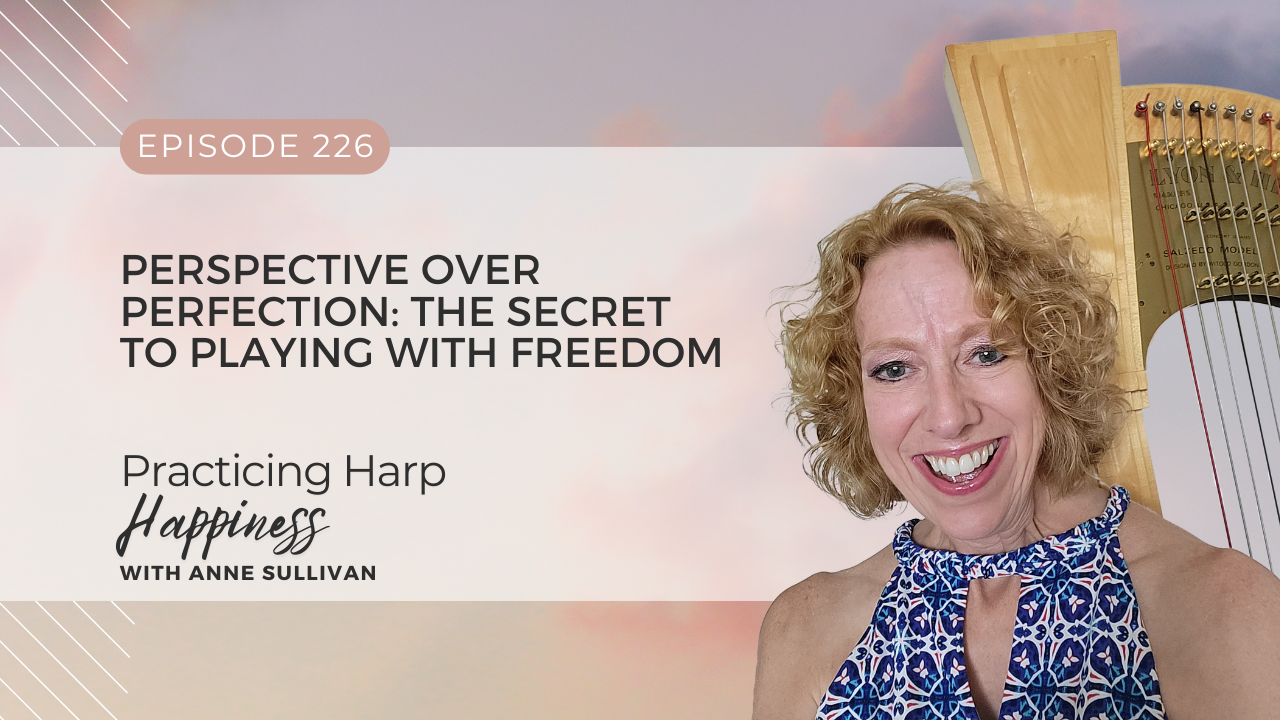
I’m sure you’ve seen that famous optical illusion picture that can be perceived either as two faces in profile looking at each other, or as a vase. That image is named the “Rubin Vase,” after Danish psychologist Edgar Rubin, who authored a book in 1915 called “Visual Perception.” This image, and others like it, have stimulated much scientific debate about how our brains understand and process images.
What fascinates me is that moment when my understanding of the image shifts, that instant where I can see the second interpretation of the picture. Naturally, there’s a technical term for that; it’s called a Gestalt switch. A Gestalt switch occurs when you change your perspective from one view of an image, a sound or an experience. As with the Rubin vase, you first saw it one way - as a vase - and now you see it another way - as two faces. There is much debate about the cognitive processes that allow this switch to happen, but there seems to be general agreement that the switch is ha...
#225: The Surprising Power of Just One More
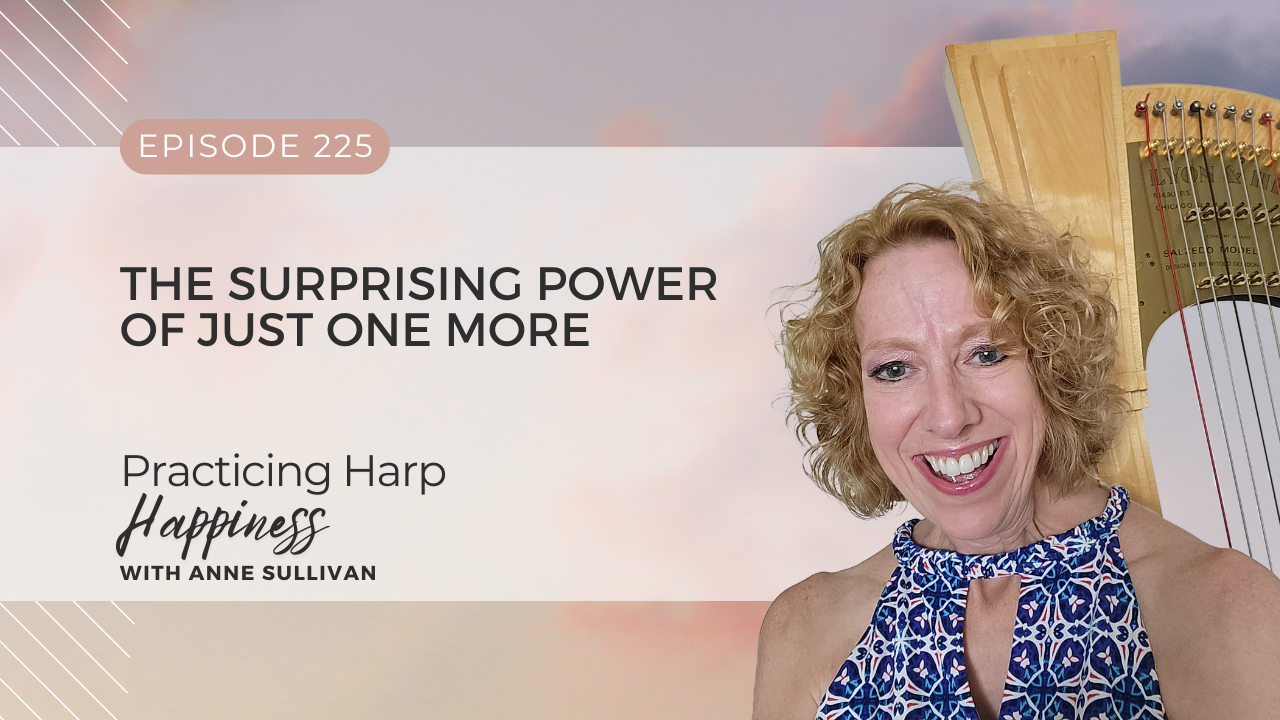
Imagine you’re looking at a box of chocolates, knowing you’ve already had at least three too many. Your hostess is holding out the box to you, saying, “Have just one more. It couldn’t hurt.”
It’s hard to actually know what one more would do. That “one more” candy might be the one that pulls out your filling. That “one more” episode of your favorite Netflix show might turn into an hours-long binge watch. That “one more” task before you leave the house might be the one that makes you miss your train.
But there’s the other side of “one more” too. The extra rep in the gym that builds muscle and stamina. The extra pinch of spice that makes a dish delectable. That extra touch to anything handmade that makes it unique and treasured. Those are just a few examples of the beneficial power of “one more.”
There are lots of opportunities for “one mores” in our harp playing, both helpful and distinctly unhelpful. When you know which of those extras you should avoid, you can stay out of some of...
#224: Teacher to Student: If I Knew Then What I Know Now
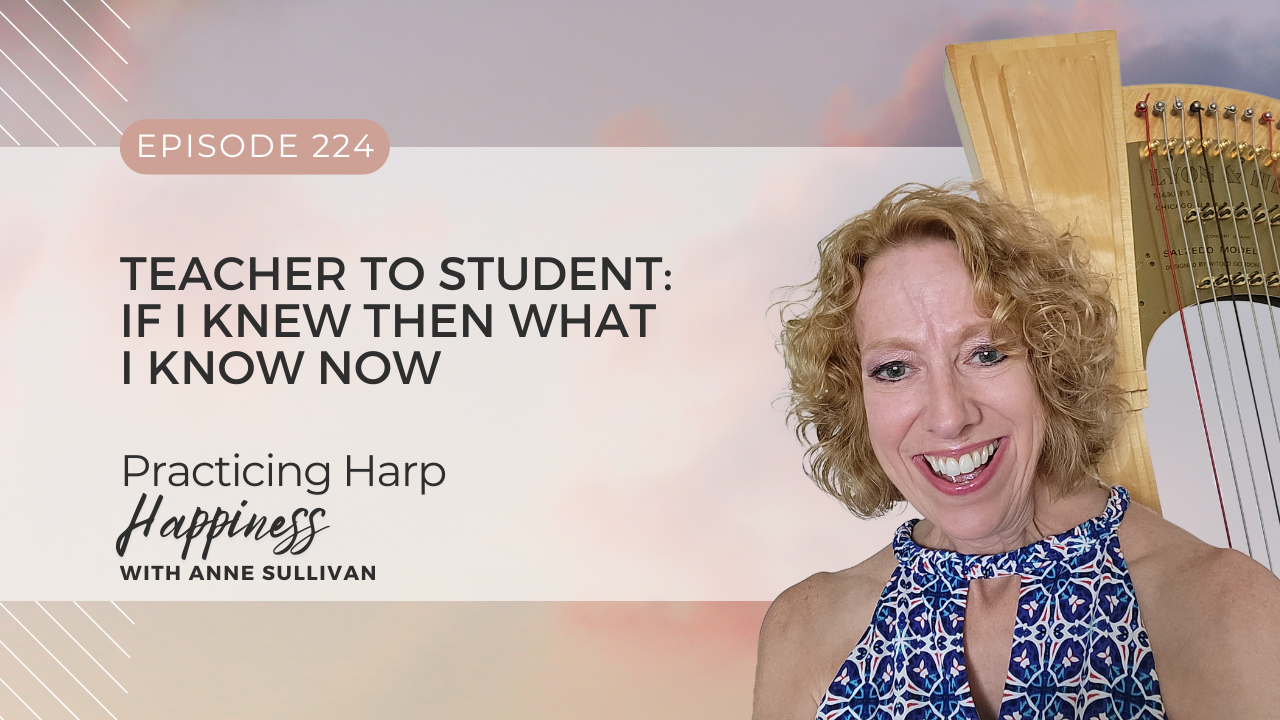
How often do we say, “If I only knew then, what I know now”? Sometimes it’s about life experience, like surviving teenage drama. Sometimes it’s about turning down an opportunity, like not buying stock in Facebook before the company went big.
Obviously, we aren’t able to go back in time and really have a “do over.” I imagine that if we could, It’s more than possible that the result wouldn’t be what we expect. We can never know how our world would have been altered, if we’d taken the other fork in the road. We can only guess.
Here’s my “if I only knew then” statement for today: If I only knew as a young harp student what I know now as a harp teacher. The fact behind this is key. The fact is that everything I learned about being a good student, I learned from trying to be a good teacher. If I had known as a student even half of what I’ve learned through my teaching, my harp life might have been so much easier.
Most teachers of any subject will tell you how much they learn from t...
#223: Banish Your Practice Blindspots
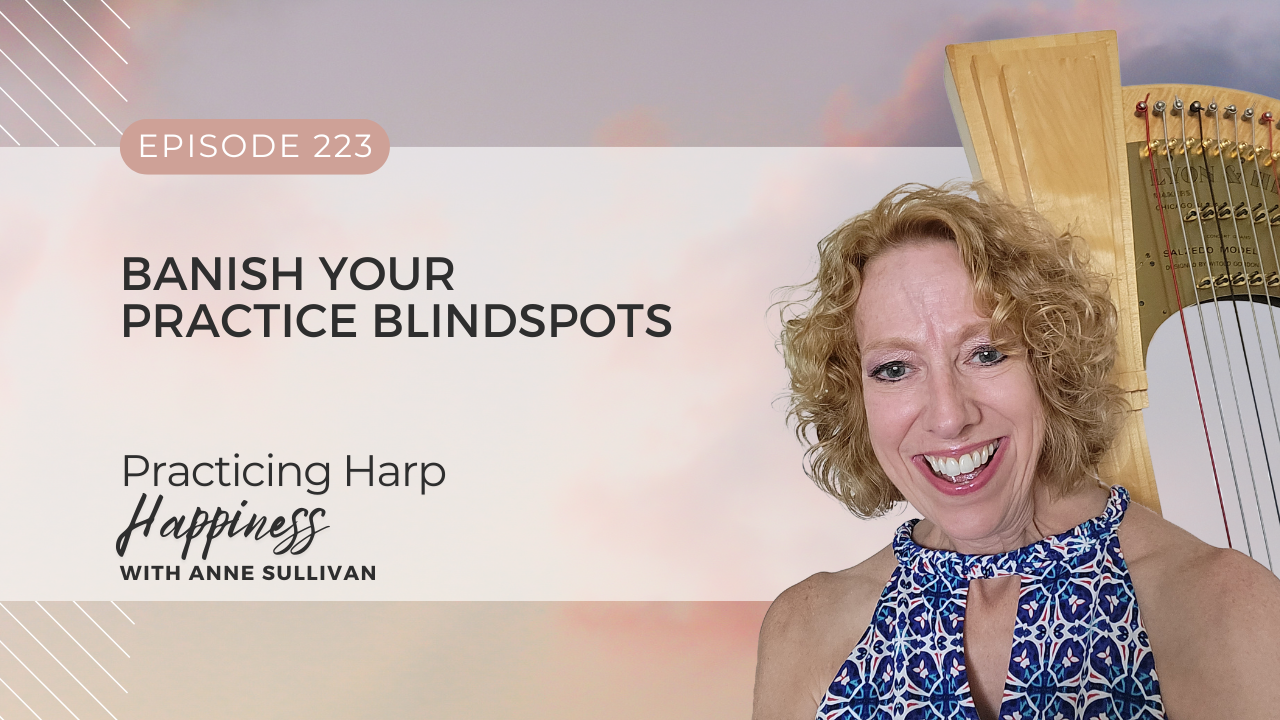
Mirror, mirror on the wall. If only my mirror could show me all.
We humans love our mirrors. At some deep-rooted level, we love to see ourselves. Maybe you remember the famous scene in the movie Lawrence of Arabia when Peter O’Toole playing Lawrence first puts on the white Arab robes and headdress. He is for the moment all by himself in the desert, so there is no dialogue. According to the film’s director, David Lean, the only instruction he gave O’Toole was to improvise what this young man Lawrence might have done in this situation.
O’Toole experiments with the sweep of his robes by running and spinning, feeling the gleaming white cloth swirl about him. Then he stops, and with no mirror to hand in the desert, takes out his shiny silver dagger from his belt and tries to use it as a mirror to see how he looks. David Lean remembers remarking under his breath during the filming, “Clever boy!”
Looking into a mirror, though, only gives us a limited perspective. We can only see what i...
#222: Susann McDonald: A Legacy of Connection
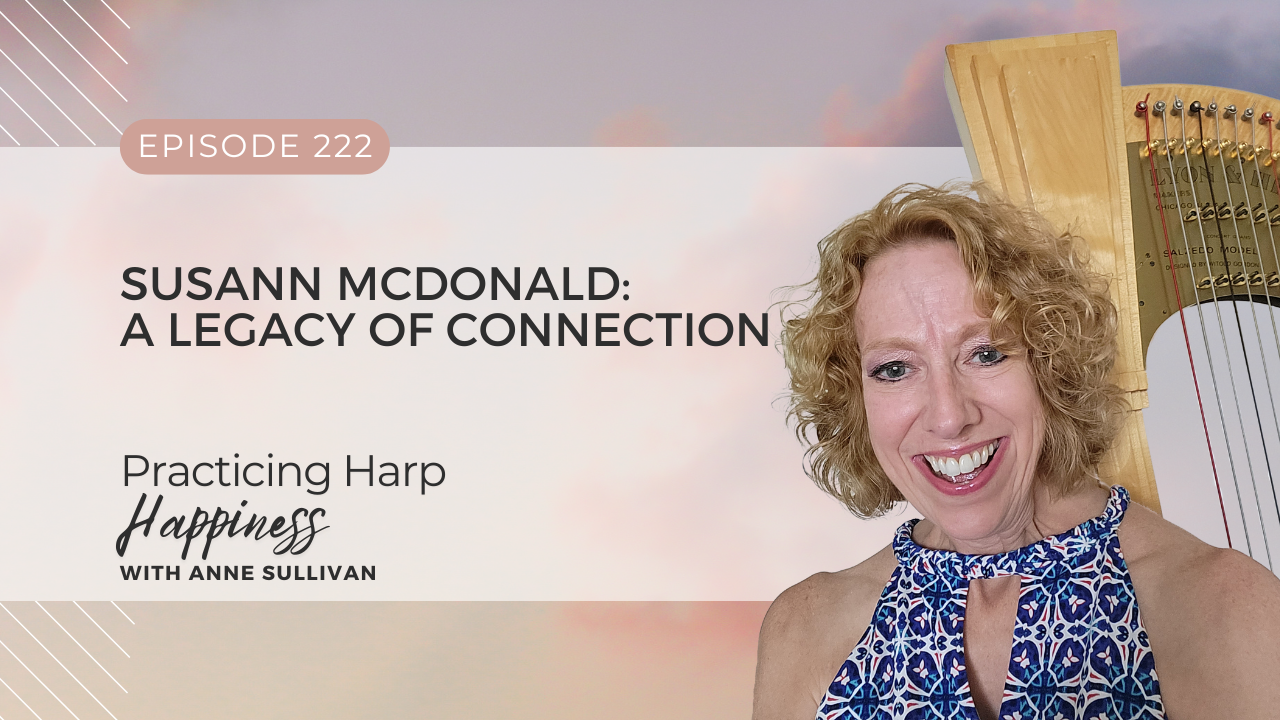
There’s a moment — sometimes only after someone is gone — when we finally see the full measure of their influence. We may have known they mattered, but loss has a way of sharpening our perspective, of showing us just how much they shaped our world.
Some people use the word legendary too easily. For harpist Susann McDonald, it’s no exaggeration.
Susann McDonald, who passed away this past May at the age of 90, left an indelible mark on the harp world. She was an acclaimed performer, a respected author, an extraordinary teacher, and a passionate advocate for our instrument. She co-founded the World Harp Congress and nurtured a global community of harpists, uniting people across continents through music.
But her story is more than a list of titles and accomplishments. It’s about the way she created a sense of belonging — for every harpist, no matter your style or skill level. Whether you play concert halls or in your living room, her influence has touched you. And today, we’ll celebr...
#221: Mistakes as Milestones: A New Mindset for Growth
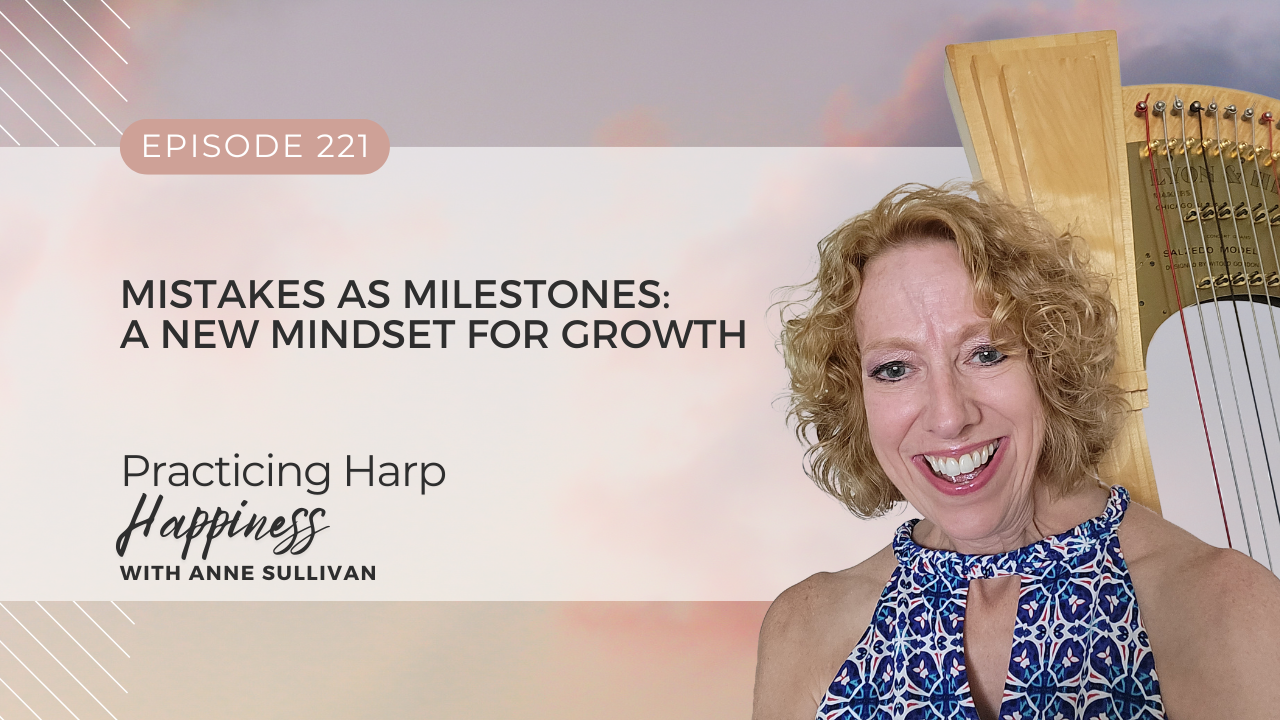
Not all mistakes are created equal. Sure, some need to be addressed and fixed. But others? They’re signs of progress. They tell you that your ears are sharper, your awareness is expanding, and your technique is evolving.
Let’s put it in context. We live in a world that’s constantly trying to correct us. Type an email, and autocorrect will instantly jump in. Google will underline a word in red, and we assume it's wrong—just because it looks unfamiliar. But autocorrect doesn’t always get it right. And neither does your inner critic. Just because something feels like a mistake doesn’t automatically mean it is.
In harp practice, this same principle applies. That little stumble in a piece might not be a sign of backsliding. It could mean you're playing at a higher level and noticing subtleties you didn’t even hear before.
Consider this: I was deadheading flowers in the garden the other day. At first, I only saw a few to snip. But as I trimmed those, more and more faded blooms seemed t...
#220: 5 Things Your Teacher Can’t Do For You - and 5 Things She or He Can

You’ve heard me say this before: I had wonderful teachers throughout my musical life. From my very first piano teacher when I started piano at age four, through my harp studies from age eight and my college years at the Curtis Institute, my teachers were all I could have wanted. They nurtured me, encouraged me, pushed me, and took me to task when that was required, and believe me, it was required from time to time. Most importantly - and this is one of my core teaching principles to this day - they were as invested in my musical journey as I was. They took my learning and my musical growth personally, not as a reflection on them, but as a mission that mattered to them because my music mattered to me.
It would be easy to say that they were the inspirations for my own teaching path, but truly, the path itself showed up more or less by accident. But as is the case with so many blessings, it showed up when I needed it and led me in directions I could never have expected. At each step a...
#219: Back to the Harp - Without Killing the Vacation Vibe

I know I’m dating myself, but here goes…
Back in the 1960’s there was a television show called “Sea Hunt.” The show centered around a free-lance scuba diver named Mike Nelson, played by Lloyd Bridges. Mike Nelson was a former Navy diver and a member of the Coast Guard Auxiliary. As a free-lance diver, he was hired for all kinds of dangerous underwater work, everything from salvaging precious cargo from wrecked ships to rescuing people trapped in caves. Each episode had dangerous situations and villains who were ready to slash the hoses on Mike’s air tanks.
In nearly every episode, Mike would have to make a hasty ascent from the depths, which he would attempt to time carefully to avoid “the bends,” a potentially fatal condition more formally called decompression sickness. On occasion. Mike would have to spend time in a decompression chamber.
Watching this as a child, I was fascinated by the danger of too hasty a return to the surface. On the one hand, Mike would be running out ...
#218: What Makes Any Piece a “Harp Piece”?
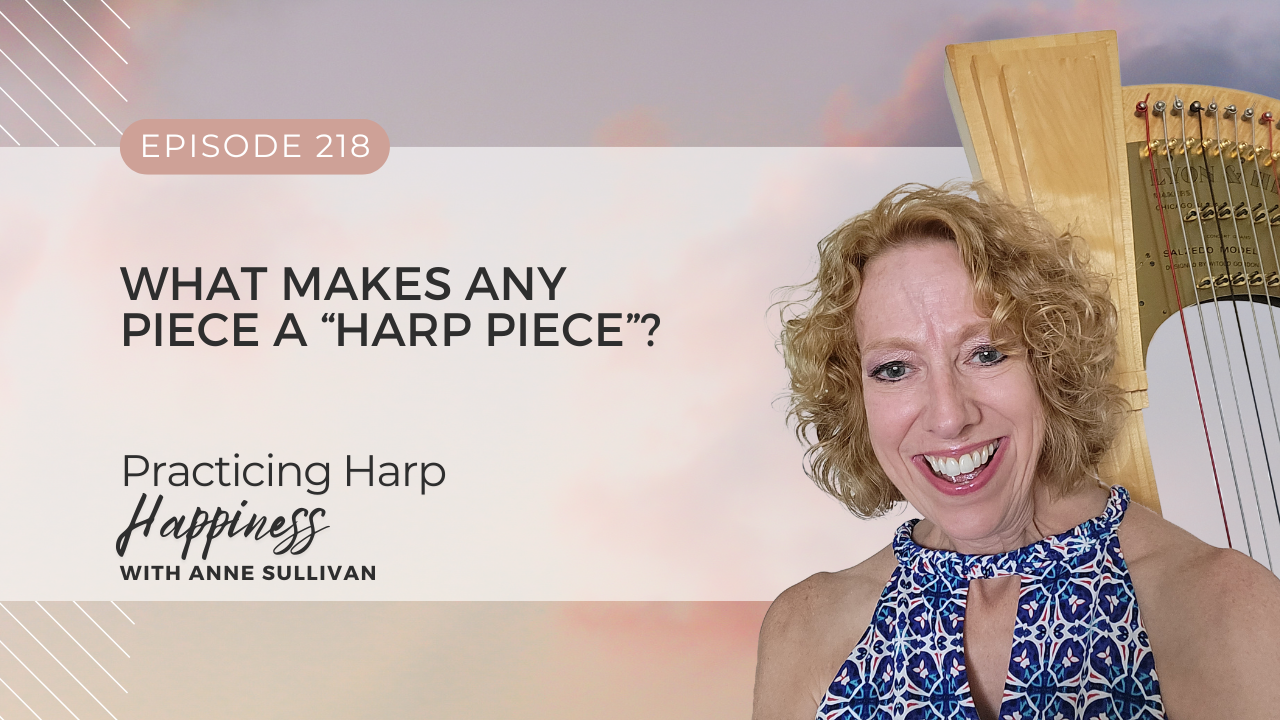
Here’s our question for today: what makes a piece of music a “harp piece”?
Does it have to have been originally written for harp? Or composed by a harpist? Or could any piece of music, no matter what instrument or instruments it was written for, be a harp piece if you play it on the harp?
I happen to think that the third answer is the correct one. Mostly. Let me explain.
If you play a piece on the harp, it has absolutely become a harp piece whether it started out that way or not. But that doesn’t necessarily mean that it should have become a harp piece. Some pieces just don’t work on the harp. Take the “1812 Overture,” for example. This piece was written by Tchaikovsky to commemorate Russia’s victory over Napoleon. It’s 15 minutes long, It requires a full symphony orchestra (minus a harp), an additional brass band, a bell carillon and a battery of cannons - yes, cannons. How could a single harp play a meaningful rendition of this monster work? You could play some of the themes f...
#217: The Secret to Dexterity: Crosstrain Your Hands
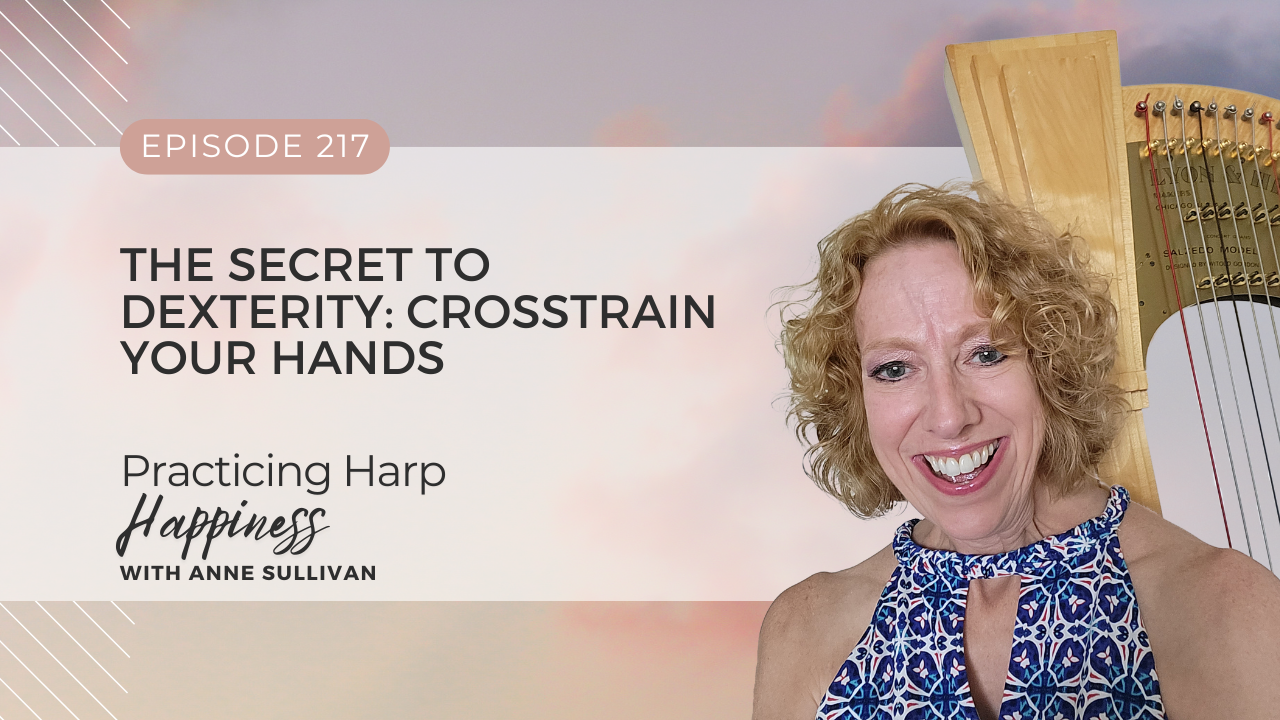
Happy Bastille Day! This isn’t a French themed podcast episode, and we won’t be breaking the bars on any prisons today. However, while the French national motto of liberté, égalité, fraternité is sounding across the globe, we should give some thought to the unequal treatment we give our hands. I mean the difference in the demands we place on our right and left hands.
Probably you’ve thought about the very different roles that our hands play musically. Most often, the right hand plays a melody and the left hand plays an accompaniment. But think about it in a practical, action-related way for a moment. If our right hand specializes in melodies, then it likely is accustomed to connected, legato playing, along with some chords and arpeggios.
Our left hand, though, because it serves to support the melody, is more used to jumping between low bass notes and chords above them, or playing a series of octaves, or playing continuous arpeggiated accompaniments. That is a very different skil...

